
| RELATED INFO |
| * NSF Career awards Web site |
| * Inseok Hwang |
| * Dan Jiao |
| * Guy Lebanon |
| * Melvin Leok |
| * Chang Lu |
| * Diametric Peroulis |
| * Luo Si |

October 6, 2008
9 Purdue researchers win NSF early-career awards
WEST LAFAYETTE, Ind. - Nine Purdue University faculty members have won the National Science Foundation's most prestigious honor for outstanding young researchers in 2008.The Faculty Early Career Development awards range from $300,000-$500,000 in research funding over four or five years. About 400 researchers win the awards annually.
Purdue's recipients this year are Robin Adams, Monica Cox, Inseok Hwang, Dan Jiao, Guy Lebanon, Melvin Leok, Chang Lu, Dimitrios Peroulis and Luo Si. Details about the Purdue awardees and their research follow:
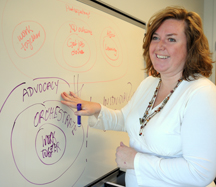 |
Cross-disciplinary thinking:
Adams, an assistant professor of engineering education, will investigate why and how people become good cross-disciplinary teachers, workers and students. The aim of this research is to better enable effective cross-disciplinary practice and learning at the undergraduate, graduate and postgraduate levels. A portion of the research will delve into how cross-disciplinary thinkers find serendipitous connections among seemingly different concepts and how they fluidly adopt different roles when participating in team projects. In-depth data will be collected from a diverse study group over a two-year period to explore how individuals develop as cross-disciplinary thinkers. Adams also will work with the Discovery Learning Center to form a "Cross-Disciplinary Commons" where educators will share different ways to approach cross-disciplinary teaching, learn from each other, and use these new ideas in their own classrooms. The research is funded by a five-year, $495,830 grant.
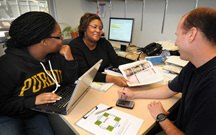 |
Career preparation:
Cox, an assistant professor of engineering education, will use a three-phased approach to better understand how to prepare graduate engineering students effectively for careers in academia and industry. Phase one of the research will identify norms, skills and attributes that experts in academia and industry believe are essential for individuals with engineering doctorates to succeed within a changing academy and society. Phase two will concentrate on designing and creating a pilot and validating an assessment tool that measures the extent to which a sample of engineering doctoral students identify with the norms, skills and attributes identified in the first phase. Phase three will evaluate students' professional development experiences in graduate studies using the instrument developed in the second phase. The integration of research and education will occur through course modules and print material that reflect research findings, the implementation of these modules in graduate engineering seminars and courses, and the involvement of undergraduate and graduate students in data collection, data analysis and module development over the duration of the project. The research is funded with a five-year, $541,507 grant.
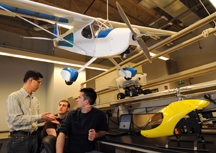 |
Complex networked systems:
Hwang, an assistant professor of aeronautics and astronautics, will develop a theory to describe the workings of "mobile networked embedded systems" and create efficient numerical algorithms and experimental testbeds to help improve the systems. The complex systems include the next-generation air traffic control system, networked robotics in factories, sensor networks and biological systems such as organs, which contain many cells interacting with each other to perform a certain function. The systems are difficult to model and optimize because they contain a large number of interacting subsystems. The algorithms also will be designed for operating autonomous air vehicles and will be tested on such vehicles. They could have broader future applications, such as enabling ground robotic vehicles to automatically maneuver around obstacles in urban environments and more-efficiently operating the power grid. The research is funded with a five-year, $400,000 grant.
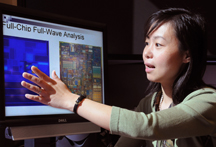 |
Next-generation chips:
Jiao, an assistant professor of electrical and computer engineering, will develop advanced algorithms to simulate and analyze the performance of next-generation computer chips. Integrated circuits generate electrical and magnetic fields, but conventional techniques analyze these fields separately. She will develop algorithms to simulate both electrical and magnetic fields simultaneously, requiring less time and computer memory than conventional algorithms. Advanced simulations are becoming increasingly necessary as circuits are growing more complex, containing features measured in nanometers. The new algorithms would make it possible to analyze an integrated circuit within 10 minutes instead of 110 days using conventional methods to analyze the same chip. Jiao also will develop an undergraduate course that combines instruction in both circuits and electromagnetic fields and a graduate-level course on computer-aided design. The research to develop "full-wave electromagnetic analysis" is funded with a five-year, $400,000 grant.
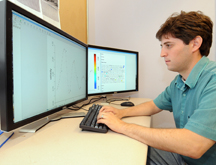 |
Document analysis:
Lebanon, an assistant professor of statistics and electrical and computer engineering who also has a courtesy appointment in computer science, will use the NSF grant to further develop a new analysis technique to classify, segment and summarize text documents. Lebanon has created a computer-assisted document browsing technology that graphically represents a text document, illustrating the points at which a document changes topic and where relevant information is concentrated. User studies have shown the technique to be more efficient and less time-consuming than existing analyses. The document analysis technique has applications for research, Web browsing and reading comprehension. It also could be refined to evaluate biological sequences such as DNA. The research is funded with a five-year, $405,000 grant. Lebanon is part of Purdue's machine learning and applied statistics group.
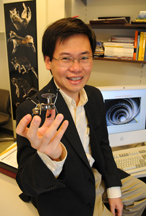 |
Movement of satellites, unmanned vehicles:
Melvin Leok, an assistant professor of mathematics and member of Purdue's Center for Computational and Applied Mathematics, will develop a mathematical framework that combines geometric and numerical techniques to control complex systems such as clusters of satellites or autonomous vehicles. The project, titled "Computation Geometric Mechanics: Foundations, Computation and Applications," will exploit certain geometric features to allow precise control of vehicles using natural dynamics, as opposed to brute force methods that use large control forces to overwhelm the dynamics. This will allow unmanned underwater vehicles to evaluate the ocean floor without disturbing sediment and more precisely orient orbital telescopes in space. In addition, this research will improve the ability to control interconnected systems of autonomous vehicles and distributed sensor networks. The project will examine subtle non-linear effects over long periods of time, which is critical for space exploration. A greater understanding of these effects will allow researchers to implement more robust and reliable numerical methods into orbital simulators and incorporate mathematical theories and simulations into mission design. The NSF has awarded Leok a five-year $450,000 grant, which was one of three CAREER awards funded by the applied mathematics program in this funding cycle.
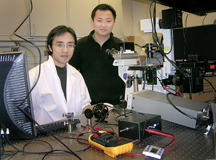 |
Opening pores in cell membranes:
Lu, an assistant professor of agricultural and biological engineering, will use NSF funds to develop and improve a method called electroporation for a process in which cells are sent through channels within a microchip and electrical pulses open pores in cell membranes. These openings allow researchers to insert relatively large molecules into the cells, a necessary but difficult step in the study of gene functions, pharmaceuticals and other cutting-edge research. Lu will work to make the process more efficient and improve the technology to the point where molecules can be automatically inserted into cells as they flow through microchips. Lu will test a series of cell lines for screening various genes, a quick method for potentially providing information on their function. The grant also will involve developing "electronic field trips" for middle and high school students to teach them about biological engineering. He will develop and teach a new course on emerging technologies in biological engineering and train undergraduate and graduate students. Lu's project will be funded with a five-year, $400,000 grant.
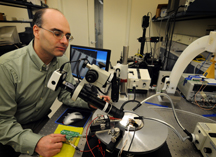 |
Liquid circuits:
Peroulis, an assistant professor of electrical and computer engineering, will use the NSF grant to help develop a new class of liquid electronic circuits and devices for high-frequency wireless communications. The research to develop liquid microwave devices is funded with a five-year, $400,000 grant. The research merges two technologies, high-frequency electronics and "microfluidics," to create liquid circuits that are powerful, reconfigurable and effectively cooled. The liquid radio components would be easy to tune to meet differing standards from one country to another. This ability is especially important in multinational military missions, where allies from different nations must communicate with each other.
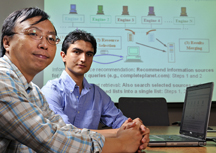 |
Improved search engines:
Si, an assistant professor of computer science, will advance the development of federated text searches, which connect to multiple search engines to offer one-stop access to information. Valuable information is hidden from traditional search engines due to an inability to keep up with regular updates, missing the connection between information distributed across multiple Web pages, and ignoring information about users and information sources. Si will improve upon the current federated text searches that focus on content relevance by incorporating information about users and information sources. He will research ways to satisfy a user's search criteria by considering content relevance, search results from past queries, personal information needs and search-response time. He will develop methods to produce accurate ranked results and analyze search results from past queries for more accurate search solutions. In addition, Si will build algorithms within existing research environments, including the U.S. government's new FedLemur system FedStats Web portal. The research is funded by a five year, $481,000 grant.
Writers: Emil Venere, (765) 494-4709, venere@purdue.edu
Elizabeth K. Gardner, (765) 494-2081, ekgardner@purdue.edu
Douglas M. Main, (765) 496-2050, dmain@purdue.edu
Clyde Hughes, (765) 494-2073, jchughes@purdue.edu
Sources:Robin Adams, (765) 496-3267, rsadams@purdue.edu
Monica Cox, (765) 496-3461, mfc@purdue.edu
Inseok Hwang, (765) 494-0687, ihwang@purdue.edu
Dan Jiao, (765) 494-5240,djiao@purdue.edu
Guy Lebanon, (765) 494-0033, lebannon@stat.purdue.edu
Melvin Leok, (765) 496-3579, mleok@math.purdue.edu
Chang Lu, (765) 494-1188, changlu@purdue.edu
Dimitrios Peroulis, 765 494-3491, dperouli@purdue.edu
Luo Si, (765) 496-9381, lsi@cs.purdue.edu
Purdue News Service: (765) 494-2096; purduenews@purdue.edu
PHOTO CAPTION:
Robin Adams, an assistant professor of engineering education, describes themes in her research to investigate why and how people become good cross-disciplinary teachers, workers and students. (Purdue News Service photo/David Umberger)
A publication-quality photo is available at https://www.purdue.edu/uns/images/+2008/adams-robinNSF.jpg
PHOTO CAPTION:
Monica Cox (at center), an assistant professor of engineering education, speaks with graduate students Tenille Medley and Nathan McNeill during a research meeting. (Purdue News Service photo/David Umberger)
A publication-quality photo is available at https://www.purdue.edu/uns/images/+2008/nsf-cox.jpg
PHOTO CAPTION:
Inseok Hwang, at left, an assistant professor of aeronautics and astronautics, works with graduate students Brandon Wampler, middle, and James Goppert, to develop "mobile networked embedded systems" and create efficient numerical algorithms and laboratory experiments to help improve the systems. (Purdue News Service photo/David Umberger)
A publication-quality photo is available at https://www.purdue.edu/uns/images/+2008/hwang-atc.jpg
PHOTO CAPTION:
Dan Jiao, an assistant professor of electrical and computer engineering, describes her research to develop scalable algorithms for simulations to guide the design of next-generation computer chips. (Purdue News Service photo/David Umberger)
A publication-quality photo is available at https://www.purdue.edu/uns/images/+2008/jiao-chipdesign.jpg
PHOTO CAPTION:
Guy Lebanon, assistant professor of statistics and electrical and computer engineering, examines the results from his document browsing technology. (Purdue News Service photo/David Umberger)
A publication-quality photo is available at https://www.purdue.edu/uns/images/+2008/nsf-lebanon.jpg
PHOTO CAPTION:
Melvin Leok, an assistant professor of mathematics, shows a toy that illustrates the rotations, shape changes and geometric phenomena involved in the conservation of angular momentum. (Purdue News Service photo/David Umberger)
A publication-quality photo is available at https://www.purdue.edu/uns/images/+2008/nsf-leok.jpg
PHOTO CAPTION:
Chang Lu, at right, a professor of agricultural and biological engineering, and graduate student Jun Wang run a test on their microfluidic chip that fuses cells. (Purdue Agricultural Communication photo/Tom Campbell)
A publication-quality photo is available at https://www.purdue.edu/uns/images/+2006/lu-electrofuse.jpg
PHOTO CAPTION:
Dimitrios Peroulis, an assistant professor of electrical and computer engineering, tests a "MEMS actuator," or a tiny machine with microscopic parts needed for future liquid electronic circuits and devices for high-frequency wireless communications. (Purdue News Service photo/David Umberger)
A publication-quality photo is available at https://www.purdue.edu/uns/images/+2008/peroulis-liquidcircuits.jpg
PHOTO CAPTION:
Luo Si, from left, an assistant professor of computer science, and graduate student Suleyman Cetintas work on a presentation explaining an improved method for federated text searches that will better fulfill a user's search criteria. (Purdue News Service photo/Andy Hancock)
A publication-quality photo is available at https://www.purdue.edu/uns/images/+2008/nsf-si.jpg
To the News Service home page
